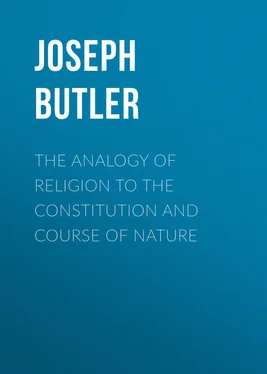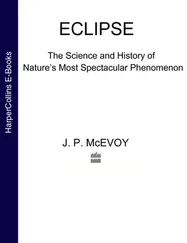Joseph Butler - The Analogy of Religion to the Constitution and Course of Nature
Здесь есть возможность читать онлайн «Joseph Butler - The Analogy of Religion to the Constitution and Course of Nature» — ознакомительный отрывок электронной книги совершенно бесплатно, а после прочтения отрывка купить полную версию. В некоторых случаях можно слушать аудио, скачать через торрент в формате fb2 и присутствует краткое содержание. Жанр: foreign_antique, foreign_prose, на английском языке. Описание произведения, (предисловие) а так же отзывы посетителей доступны на портале библиотеки ЛибКат.
- Название:The Analogy of Religion to the Constitution and Course of Nature
- Автор:
- Жанр:
- Год:неизвестен
- ISBN:нет данных
- Рейтинг книги:3 / 5. Голосов: 1
-
Избранное:Добавить в избранное
- Отзывы:
-
Ваша оценка:
- 60
- 1
- 2
- 3
- 4
- 5
The Analogy of Religion to the Constitution and Course of Nature: краткое содержание, описание и аннотация
Предлагаем к чтению аннотацию, описание, краткое содержание или предисловие (зависит от того, что написал сам автор книги «The Analogy of Religion to the Constitution and Course of Nature»). Если вы не нашли необходимую информацию о книге — напишите в комментариях, мы постараемся отыскать её.
The Analogy of Religion to the Constitution and Course of Nature — читать онлайн ознакомительный отрывок
Ниже представлен текст книги, разбитый по страницам. Система сохранения места последней прочитанной страницы, позволяет с удобством читать онлайн бесплатно книгу «The Analogy of Religion to the Constitution and Course of Nature», без необходимости каждый раз заново искать на чём Вы остановились. Поставьте закладку, и сможете в любой момент перейти на страницу, на которой закончили чтение.
Интервал:
Закладка:
– Reasoning on this ground is justified by all experience.
– The constitution of things is as if we were free.
4.) If the doctrine of necessity be true, and yet, when we apply it to life, always misleads us; how, then, can we be sure it would not mislead us with respect to future interests?
5.) It follows that if there are proofs of religion on the supposition of freedom, they are just as conclusive on the supposition of necessity.
3.It does not refute the notion that God has a will and a character.
1.) It does not hinder us from having a will and a character; from being cruel, or benevolent, or just, &c.
2.) If necessity be plead as the excuse for crime, it equally excuses the punishment of crime; for if it destroys the sin of the one, it destroys the sin of the other.
3.) The very assumption of injustice in punishing crime, shows that we cannot rid ourselves of the notion of justice and injustice.
Objec. If necessity be reconcilable with the character of God, as portrayed in Christianity, does it not destroy the proof that he has that character; and so destroy the proofs of religion?
Ans. No. Happiness and misery are not our fate, but the results of our conduct. God’s government is that of a father and a magistrate; and his natural rule of government must be veracity and justice. We shall proceed to show that,
1.It is a plain fact that God rewards and punishes.
1.) He has given us a moral faculty, by which we discern between actions, and approve or disapprove, &c.
2.) This implies a rule , a peculiar kind of rule; i. e. one from which we cannot depart without being self-condemned.
3.) The dictates of our moral faculty are God’s laws, with sanctions. It not only raises a sense of duty , but a sense of security in obeying, and danger in disobeying; and this is an explicit sanction.
4.) God’s government must conform to the nature he has given us; and we must infer that in the upshot happiness will follow virtue, and misery vice.
5.) Hence religious worship is a duty, if only as a means of keeping up the sense of this government.
6.) No objection from necessity can lie against this course of proof.
– The conclusion is wholly and directly from facts; not from what might appear to us to be fit , but from what his actions tell us he wills .
2.Natural religion has external evidence which necessity, if true, does not affect.
1.) Suppose a person convinced of the truths of natural religion, but ignorant of history, and of the present state of mankind, he would inquire:
– How this religion came?
– How far the belief of it extended?
– If he found that some one had totally propounded it, as a deduction of reason, then, though its evidences from reason would not be impaired, its history would furnish no further proof.
2.) But such an one would find, on the contrary,
– That essentially it had been professed in all countries.
– And can be traced up through all ages.
– And was not reasoned out , but revealed.
3.) These things are of great weight.
– Showing natural religion to be conformed to the common sense of mankind.
– And either that it was revealed, or forces itself upon the mind.
– The rude state of the early ages leads to the belief of its being revealed, and such is the opinion of the learned.
3.Early pretences to revelation indicate some original real one from which they were copied.
– The history of revelation is as old as history itself.
– Such a fact is a proof of religion, against which there is no presumption.
– And indicates a revelation prior to the examination of the book said to contain it; and independent of all considerations of its being corrupted, or darkened by fables.
4.It is thus apparent that the external evidence of religion is considerable; and is not affected by the doctrine of necessity.
1. The danger of taking custom, &c. for our moral rule.
1.) We are all liable to prejudice.
2.) Reason may be impaired, perverted, or disregarded.
3.) The matter in hand is of infinite moment.
2. The foregoing observations amount to practical proof.
Objec. Probabilities which cannot be confuted, may be overbalanced by greater probabilities: much more by demonstration. Now, as the doctrine of necessity must be true, it cannot be that God governs us as if we were free when he knows we are not.
Ans. This brings the matter to a point, and the answer is not to be evaded, – viz.: that the whole constitution and course of things shows this reasoning to be false, be the fallacy where it may.
The doctrine of freedom shows where, – viz.: in supposing ourselves necessary agents when in fact we are free.
Admitting the doctrine of necessity, the fallacy evidently lies in denying that necessary agents are accountable; for that they are rewarded and punished is undeniable.
Conclusion. – It follows that necessity, if true, neither proves that God will not make his creatures happy or miserable according to their conduct, nor destroys the proofs that he will do so. That is, necessity, practically, is false.
Moral government, as a fact , has now been considered; it remains for us to remove objections against its wisdom and goodness . A thing being true does not prove it to be good.
In arguing as to its truth, analogy could only show it to be credible. But, if a moral government be admitted as a fact, analogy makes it credible that it is a scheme or system, and that man’s comprehension of it is necessarily so limited, as to be inadequate to determine its injustice.
This we shall find to be the case.
Doctrine. On the supposition that God exercises moral government, the analogy of nature teaches that it must be a scheme, and one quite beyond our comprehension.
1.The parts curiously correspond to each other; individuals to individuals, species to species, events to events; and all these both immediate and remote.
2.This correspondence embraces all the past, and all the future; including all creatures, actions, and events.
1.) There is no event, which does not depend for its occurrence on some further thing, unknown to us; we cannot give the whole account of any one thing.
2.) Things apparently the most insignificant, seem to be necessary to others, of the greatest importance.
3.If such is God’s natural government, it is credible that such is his moral government.
1.) In fact they are so blended as to make one scheme.
– One is subservient to the other, just as the vegetable kingdom subserves the animal, and our animal organization subserves our mental.
– Every act of God seems to look beyond the occasion, and to have reference to a general plan.
– There is evidently a previous adjustment.
· The periods, &c. for trying men.
· The instruments of justice.
· The kinds of retribution.
2.) The whole comprises a system, a very small part of which is known to us: therefore no objections against any part can be insisted on.
3.) This ignorance is universally acknowledged, except in arguing against religion. That it ought to be a valid answer to objections against religion, we proceed to show.
Читать дальшеИнтервал:
Закладка:
Похожие книги на «The Analogy of Religion to the Constitution and Course of Nature»
Представляем Вашему вниманию похожие книги на «The Analogy of Religion to the Constitution and Course of Nature» списком для выбора. Мы отобрали схожую по названию и смыслу литературу в надежде предоставить читателям больше вариантов отыскать новые, интересные, ещё непрочитанные произведения.
Обсуждение, отзывы о книге «The Analogy of Religion to the Constitution and Course of Nature» и просто собственные мнения читателей. Оставьте ваши комментарии, напишите, что Вы думаете о произведении, его смысле или главных героях. Укажите что конкретно понравилось, а что нет, и почему Вы так считаете.












